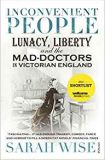Inconvenient People: Lunacy, Liberty and the Mad-Doctors in Victorian England by Sarah Wise
Many a family in Victorian England had a problem husband, wife, son or daughter whom they felt ought to be ‘locked away’. Only occasionally if ever was it for totally unselfish reasons connected with their mental health and well-being. More often than not it was to settle old scores, or so the family could get their hands on the victim’s fortune or business, or sometimes because, as the title of this book suggests, they were merely ‘inconvenient’.
| Inconvenient People: Lunacy, Liberty and the Mad-Doctors in Victorian England by Sarah Wise | |
|
| |
| Category: History | |
| Reviewer: John Van der Kiste | |
| Summary: A perceptive study of how 'inconvenient' people were sometimes treated by their families in Victorian England, who found it all too easy to have them confined in lunatic asylums, generally for the most selfish of reasons. | |
| Buy? Yes | Borrow? Yes |
| Pages: 473 | Date: October 2012 |
| Publisher: Bodley Head | |
| ISBN: 9781847921123 | |
|
| |
Sarah Wise takes a dozen cases in which individuals had the misfortune to fall foul of their nearest but no longer dearest. According to the Madhouse Act, passed in 1828 to regulate what had previously been a free market in ‘lunacy’, a person had to be certified insane by two different doctors, in two separate interviews, and neither doctor could have any connection with the madhouse that had been chosen to receive the patient. However it was one law for the relatively affluent and another for the poor - in the case of a pauper, it merely needed one doctor and a magistrate or public person to testify to their ‘insanity’.
One year after the act, Edward Davies, who had raised himself from a lowly apprentice to become one of the most successful tea dealers in London, was seized by two hired roughs from an inn where he had just spent the night. He was to be examined by a number of doctors, mostly in his mother’s pay, and forcibly confined in his own house. Having been a devoted son to an increasingly aggressive and domineering parent, he had understandably begun to show signs of unsettling eccentricity, such as reciting poetry in a loud voice, and carrying a pistol. If he could be declared insane, he would be adjudged unable to control the affairs of the business, which would pass to her. A crowd intervened to prevent him from being taken away, but it was insufficient to prevent an eleven-day inquisition at which his mother’s tame doctors attempted to testify as to his mental shortcomings. Fortunately for him the jury’s unanimous verdict pronounced him of ‘perfectly sound mind’, and he was a free man.
The juries and the public were nearly always on the side of the oppressed, and it is pleasing to report that a number of such actions proved unsuccessful. Often regarded at the time as a radical, even campaigning newspaper, The Times noted ruefully that ‘mad-doctors’ were inclined to take it for granted that hardly anybody was sane, and that anybody ran the risk of being seized by a pair of ruffians and placed in captivity for life if they were unfortunate enough to be in somebody’s way. Luckily, it rarely proved a life sentence. In 1858 Rosina Bulwer-Lytton angrily appeared on the hustings to denounce her estranged husband Edward, the then very successful novelist whose works are hardly remembered today, as he was standing for Parliament. Though they had long been separated, it was the last step in an increasingly acrimonious history of their relationship before he denied her access to their children and had her committed to an asylum, from which she was freed a few weeks later after a public outcry. Less fortunate was Catherine Cumming, who also survived years of an increasingly unhappy marriage, and in widowhood fell foul of her daughters and greedy sons-in-law. Becoming increasingly peculiar in her last years, she was constantly dogged by inquisitions from mad-doctors, lamenting bitterly that if only she had been poor, she would have been left alone. She was still being interrogated as she lay, ill and weary in her bedroom, until the moment she drew her final breath.
Mention is made of the recurring mad wife in Victorian literature, or more accurately, the sane wife being driven mad – Bertha Mason in ‘Jane Eyre’, Laura Fairlie in ‘The Woman in White’ or Bella Manningham in Patrick Hamilton’s Victorian melodrama for the stage, ‘Gas Light’, later adapted for the classic 1940 movie of the same title. As the author shows us, the ‘madwoman in the attic’ was equally likely to have been a man, although tales tended to be seen as rather more interesting and lurid if the villain was male rather than female. (Therein lies an interesting debate for gender studies in literature, perhaps).
The book ends with an overview of lunacy law amendment bills in the 1880s, which culminated in the 1890 Lunacy Act which placed the certification of all alleged lunatics under the auspices of a public figure, namely a magistrate. Detention was thus made more difficult, and release for the supposedly afflicted much easier. Private proprietor mad-doctors, whose attitude to those nominally under their care was probably little better than those of the notorious Victorian baby-farmers, had shot themselves in the foot when it was clear that their cure rates failed to match those of county asylums, and they suffered from the new legislation. (About time too, perhaps). Yet not until this was superseded by the Mental Health Act of 1959 were long-stay patients in the large asylums reassessed, thus highlighting the shocking extent of unnecessary incarceration.
Attitudes to madness and what constitutes it have naturally varied over the last two centuries or so. As an investigation into how alleged insanity was almost regarded as an industry by the unscrupulous, this has thrown valuable light on to a disquieting and often overlooked facet of Victorian social history, something for which the author richly deserves our thanks.
If the subject appeals to you then you might be interested in The Painted Bridge by Wendy Wallace - a novel on the same theme.
Please share on: ![]() Facebook,
Facebook, ![]() Twitter and
Twitter and
![]() Instagram
Instagram
![]() You can read more book reviews or buy Inconvenient People: Lunacy, Liberty and the Mad-Doctors in Victorian England by Sarah Wise at Amazon.co.uk Amazon currently charges £2.99 for standard delivery for orders under £20, over which delivery is free.
You can read more book reviews or buy Inconvenient People: Lunacy, Liberty and the Mad-Doctors in Victorian England by Sarah Wise at Amazon.co.uk Amazon currently charges £2.99 for standard delivery for orders under £20, over which delivery is free.
![]() You can read more book reviews or buy Inconvenient People: Lunacy, Liberty and the Mad-Doctors in Victorian England by Sarah Wise at Amazon.com.
You can read more book reviews or buy Inconvenient People: Lunacy, Liberty and the Mad-Doctors in Victorian England by Sarah Wise at Amazon.com.
Comments
Like to comment on this review?
Just send us an email and we'll put the best up on the site.
Margaret Wilde said:
Thomas Szasz was a Professor of Psychiatry who did not 'believe in' mental illness. See http://www.telegraph.co.uk/news/obituaries/medicine-obituaries/9551378/Dr-Thomas-Szasz.html. Having read most of his books in the 80s, I am in agreement with his views on "the myth of mental illness" and about the injustice that is done by a belief in mental illness (or the pretence of believing in it). He sought to protect the victims of psychiatric labelling from the harm such labels do in the hands of medically-qualified knaves and fools supported by a misbegotten legal system. I welcome the book reviewed on this webpage, as I welcome all such books which highlight and condemn the incarceration and cruel treatment of people who have committed no crime.

